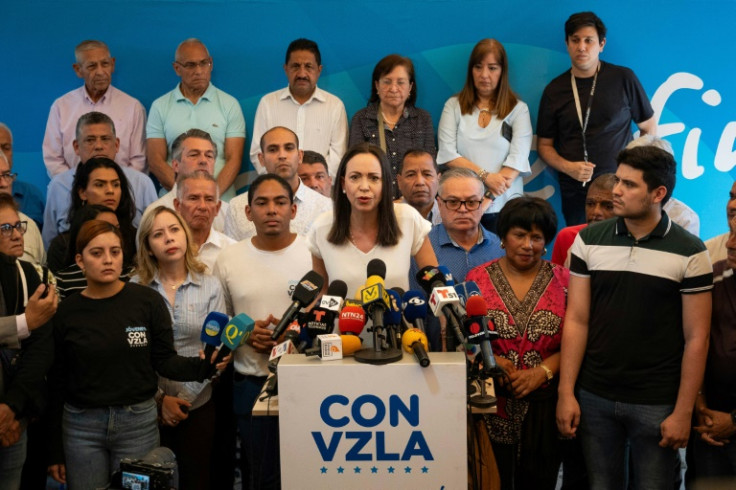
Venezuela's main opposition coalition said Tuesday it had managed to register a proxy candidate to face off against President Nicolas Maduro in the country's July elections -- but not the one it wanted.
With popular leader Maria Corina Machado banned from public office, the plan had been to register another stand-in candidate, 80-year-old university professor Corina Yoris. But the coalition found itself blocked from doing so by the time the deadline struck at midnight on Monday.
The National Electoral Council (CNE) on Tuesday released the surprise name of Edmundo Gonzalez Urruti, a political scientist and former ambassador, as the candidate of the Democratic Unitary Platform (PUD).
The coalition said in a statement that his candidacy was "provisional ... given the clear impossibility of registering the chosen candidate so far."
The United States and Brazil were among several nations that expressed alarm after the coalition was unable to register Yoris.
Maduro, 61, is seeking to extend his turbulent decade in power with a third six-year term, amid rising concerns over his slide into authoritarianism and crackdown on dissent.
"What we warned about for many months ended up happening: the regime chose its (opposition) candidates," Machado told a press conference.
While Machado overwhelmingly won an opposition primary last year, courts loyal to Maduro banned her from holding public office for 15 years on charges of corruption widely dismissed as spurious, and for supporting Western sanctions against the government.
Another opposition figure, the veteran politician Manuel Rosales, also managed to register. He is seen as a more palatable opponent by Maduro's socialist government.
Rosales, of the Un Nuevo Tiempo (UNT) party, said he had made the decision to register himself as a candidate to "open a space for Venezuelans to vote."
He said the alternative was "to abstain and have (President Nicolas) Maduro stay there for six more years without doing anything else."
With opinion surveys placing Maduro's approval rating at between 15 and 20 percent, analysts say dividing the opposition will be key to his victory.
"Maduro knows that he loses to any opposition candidate who achieves unity and raises the spirit of citizen participation," political analyst Yoel Lugo told AFP.
"The worst scenario for the opposition is to maintain the tone of internal tension."
Maduro has faced criticism from the international community for interference in the election, after his government and the opposition sealed a deal in Barbados last year to hold a free and fair vote with international observers present.
The White House said it was "deeply concerned" by the decision to block Yoris.
"It is critical that the Maduro regime recognize and respect the right of all candidates to run," White House spokeswoman Karine Jean-Pierre told reporters.
The head of the United Nations regrets "any development that could impede electoral guarantees," said Farhan Haq, a spokesman for Secretary-General Antonio Guterres.
Underlining the worries among Venezuela's anti-Maduro activists, several members of the opposition have been taken in at the Argentine ambassador's Caracas residence, Buenos Aires said Tuesday.
Argentina "has welcomed political leaders of the opposition in the Official Residence of the Embassy," a government statement said, following press reports that six Machado-linked activists, including a close aide, had requested asylum.
Many countries refused to accept the results of Maduro's last election in 2018, alleging fraud and a lack of transparency, and instead recognized parliamentary speaker Juan Guaido as the country's legitimate leader.
Six years later, Maduro is still firmly in charge of the oil-rich nation after Guaido's government collapsed and the war in Ukraine choked energy supplies and shifted global priorities.
Maduro formalized his own run for the presidency with great fanfare on Monday, with thousands turning out to rally behind him and the ruling United Socialist Party of Venezuela.
Several other candidates presenting themselves as opposition figures also registered, but most are considered aligned with Maduro's government.




